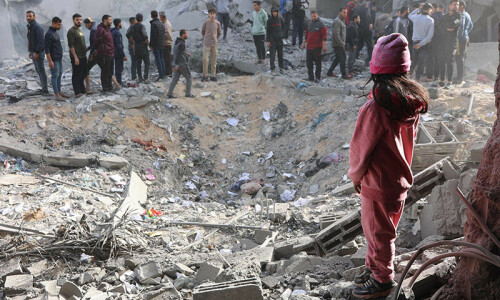NEW YORK: An admitted conspirator in a plot to bomb New York City subways learned to make explosives at an Al Qaeda training compound in Pakistan and recorded a “martyrdom” video to be played after his suicide attack, he told a court on Wednesday.
Najibullah Zazi, 27, a legal US resident from Afghanistan, testified for the second day against Adis Medunjanin, 28, a Bosnian-born US citizen on trial in Brooklyn federal court on charges of conspiring to kill US troops in Afghanistan, providing material support to Al Qaeda and plotting to use weapons of mass destruction on US soil.
Medunjanin has pleaded not guilty with his lawyer saying he backed out of the plot to attack New York.
Zazi pleaded guilty in February 2010 and agreed to testify against Medunjanin, his former high school classmate from the New York City borough of Queens, in hopes of a reduced prison term.
He said he and Medunjanin, along with Zarein Ahmedzay, an Afghan-born US citizen, plotted to carry out suicide attacks at the behest of Al Qaeda. Ahmedzay also pleaded guilty and testified against Medunjanin.
Saying it was moral to kill commuters in the United States and that they considered targeting a Walmart store, Zazi also provided jurors with a glimpse inside a Al Qaeda's compound in Waziristan - a mountainous region in northern Pakistan near the Afghanistan border - where he said he received bomb-making training in 2008.
Zazi, Medunjanin and Ahmedzay traveled to Pakistan in August 2008, hoping to gain entry into Afghanistan, where they intended to join the Taliban. They were turned back at the border and instead invited by Al Qaeda operatives to a compound in Waziristan, according to testimony from Ahmedzay and Zazi.
There, the three friends spent about a week listening to lectures and watching videos of Al Qaeda attacks on the Danish embassy in Pakistan in 2008 and the 2005 London subway bombings, while cooking, napping and praying, Zazi and Ahmedzay said.
They discussed their mission with an Al Qaeda operative who called himself Hamad, Zazi said Wednesday. Hamad is an alias for Adnan El Shukrijumah, according to the federal indictment.
Shukrijumah, a Guyanese citizen, is thought to have served as one of the leaders of al Qaeda's external operations program, according to federal authorities. He is at large.
Zazi said Hamad told them they should aim for something that caused maximum economic harm to the United States, including possibly targeting a Walmart store. Walmart, Hamad told the men, “is a very useful target,” Zazi testified. They also mulled targets including the New York Stock Exchange, shopping malls, movie theaters, Times Square, Penn Station and public transportation, which, Zazi said, “Is the heart of everything in New York.”
Second Compound
Zazi said he was taken to a second compound in Waziristan, similar to the first. There, he worked with several Al Qaeda members - two South Indians and an Arabic man, along with Hamad, all of whom went by aliases - to learn the essentials of bomb-making, Zazi said.
Al Qaeda teachers provided English instructions on how to make the bomb and how to put it together safely without attracting notice, Zazi said. Many components could be found or made from items such as nail polish remover, pipe cleaning-chemicals, and Christmas lights and cooking oil, Zazi said.
He said he kept detailed notes and later practiced putting together components of the suicide bomb. At one point, an Al Qaeda operative videotaped Zazi and Hamad conducting a successful test of an explosive device that Zazi made, Zazi said.
During the week Zazi spent at the second compound, Hamad asked him to record a “martyrdom video,” which would serve as a final will and testament following his planned suicide operation, Zazi said.
“He (Hamad) said this video will be released once you do the mission,” Zazi said.
Hamad wrote the statement, and Zazi read it. It consisted of verses from the Koran and messages about US military presence in Afghanistan and Iraq, Zazi said. Hamad promised to store it at a secure location until the attacks were completed, Zazi said.
Medunjanin's lawyer, Robert Gottlieb, later asked Zazi if he thought it was moral to kill people on the subway.
“In America, yes,” Zazi said.
Zazi was expected to conclude his testimony on Thursday.
The case is US v. Medunjanin, in the US District Court for the Eastern District of New York, no. 10-19.













































Dear visitor, the comments section is undergoing an overhaul and will return soon.